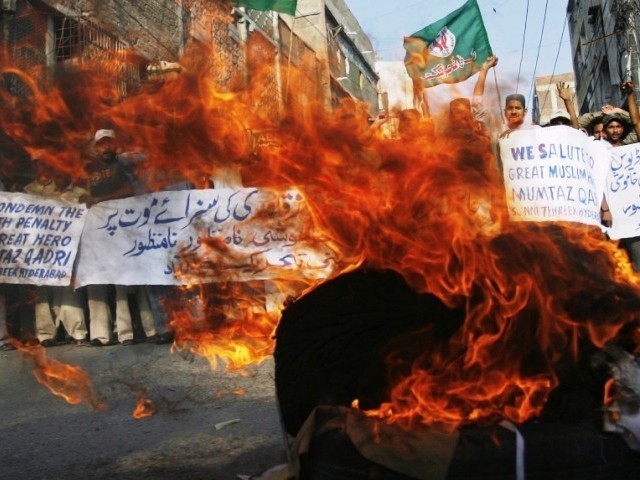
Commentary by Hazrat Mirza Bashiruddin Mahmood Ahmad (may Allah be pleased with him). The most comprehensive commentary on Holy Quran ever written. US$100.00 [Order] |
Elucidation of Objectives is an English translation of Taudih-e-Maram (Urdu), a companion volume of the two treatises Fat-he-Islam and Izala-e-Auham, written in 1891 by Hadhrat Mirza Ghulam Ahmad of Qadian, The Promised Messiah and Mahdi as, Founder of the Ahmadiyya Muslim Jama'at. The book contains a detailed refutation of the conventional Muslim and Christian belief that Jesus was raised to the heavens alive and shall return in his material body sometime in the latter days. The Promised Messiah as has also discussed at length such abstruse and subtle themes as the nature of Angels, their relationship with God and man, and how they function as intermediaries and carry out divine commands. (Read Online) US$7.00 [Order] |
|
Pakistan |
Published: October 7, 2011
 |
KARACHI: The judge who sentenced former Punjab Governor Salmaan Taseer’s assassin, Malik Mumtaz Hussain Qadri, to death has been forced to go on leave after threats, banners and slogans at rallies proclaiming him a non-Muslim and an Ahmadi.
His court in Rawalpindi was also attacked by lawyers.
The irony is that the judge of an anti-terrorism court (ATC) is dealing with an ‘action’ of terrorism that is defined in the Anti-Terrorism Act (ATA).
The law states that acts of terrorism include the “[incitement of] hatred and contempt on religious, sectarian or ethnic basis to stir up violence or cause internal disturbance”.
This basic definition has not stopped the ongoing campaign of inciting hatred.
But building a case against these individuals requires determining violations of the ATA, particularly incitement. While law enforcement and intelligence agencies are tasked with the job, their assessments are often based on their operatives’ views and biases.
For example, a Jamaat Ahmadiyya representative told The Express Tribune that when police officers entered the places of worship in Lahore after scores of Ahmadis were massacred in 2010, among their first few words were: “Saare hi marr gaye ho ya koi bacheya vi aye?” [Are all of you dead, or did someone survive?].
Former IG Sindh police Aftab Nabi says that the police should depute officers with different backgrounds to get a broader analysis. This, he says, would help overcome any limitations the officer has.
Despite this, law enforcement agencies have monitored people known for inflammatory speeches, such as Lashkar-e-Jhangvi’s (LeJ) Malik Ishaq, who was recently detained under the Maintenance of Public Order (MPO) Act.
Secondly, provincial governments also allow and provide security to rallies where incitement occurs. Rallies in Lahore supporting Qadri continue to be held, highlighting state complicity.
In a United States Institute of Peace report on police reforms, author Hassan Abbas referenced analysis by Khaled Ahmed on the issue: “Throughout the 1990s one or two intelligence officers in each district of Pakistan were tasked to help out members of the state-supported militant groups if the police ‘create[d] any problems for them’.”
The report further adds, “In private discussions police officers routinely mention apprehending militants and criminals but quickly receiving ‘requests’ from intelligence agencies (civilian or military) to let them go. Although the intensity of such practices has decreased in the post-9/11 environment, even today the police hesitate to pursue militants and activists associated with groups generally known for their close relationship with the intelligence services.”
Criminal lawyer Zulfiqar Abbas Naqvi disagrees with the perception that the ATA is insufficient or that the courts and police don’t do their job. “The real issue is of evidence. People need to come forward and testify. They do have fears, but what they don’t realise is that they may be setting a murderer free who will later either shoot them or someone else. A man will be caught red-handed kidnapping someone but the victim will say in court, ‘I don’t recognise this person.’ What is the court supposed to do?”
A witness protection programme has been in the works in Sindh for several months now, but has not been implemented yet.
Naqvi says suspects have also become savvier. “Suspects in terrorism cases are often picked up by the intelligence agencies who detain them for one or two months. During this time, their organisations file writ after writ about the illegal detention and rile up the public. By the time the police make a formal arrest, the court will not accept their reasons for the delay. To avoid this, the police should make the initial arrest and then the agencies can interrogate the suspect. They could also amend the period of remand.”
Published in The Express Tribune, October 7th, 2011.
|
|||||
 del.icio.us
del.icio.us digg
digg Facebook
Facebook Fark
Fark Furl
Furl Ma.gnolia
Ma.gnolia NewsVine
NewsVine Reddit
Reddit Simpy
Simpy Spurl
Spurl StumbleUpon
StumbleUpon TailRank
TailRank
